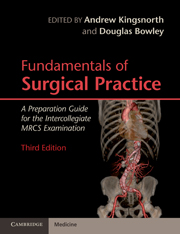Book contents
- Frontmatter
- Contents
- List of contributors
- Preface
- Section 1 Basic Sciences Relevant to Surgical Practice
- Section 2 Basic Surgical Skills
- Section 3 The Assessment and Management of the Surgical Patient
- 8 Preoperative assessment
- 9 Fundamentals of anaesthesia
- 10 Fundamentals of cancer management
- Section 4 Perioperative Care of the Surgical Patient
- Section 5 Common Surgical Conditions
- Index
- References
10 - Fundamentals of cancer management
Published online by Cambridge University Press: 03 May 2011
- Frontmatter
- Contents
- List of contributors
- Preface
- Section 1 Basic Sciences Relevant to Surgical Practice
- Section 2 Basic Surgical Skills
- Section 3 The Assessment and Management of the Surgical Patient
- 8 Preoperative assessment
- 9 Fundamentals of anaesthesia
- 10 Fundamentals of cancer management
- Section 4 Perioperative Care of the Surgical Patient
- Section 5 Common Surgical Conditions
- Index
- References
Summary
The objective of this chapter is to summarize the biological processes that drive cancer development and progression together with the key principles of clinical cancer management.
Cancer biology
Defining cancer
Neoplasia (Greek ‘new growth’) is the formation of abnormal tissue, the growth of which is not coordinated with that of normal tissues, and that persists after the cessation of the stimulus which induced the change. These features are accompanied by genetic abnormalities that alter cell growth. Although neoplasia commonly manifests as a tumour (Latin ‘abnormal mass’), neoplasia and tumour are not synonymous. Some neoplastic processes do not result in tumour formation, e.g. leukaemia. Conversely, not all clinically tumorous lesions are neoplastic, e.g. abscesses. Neoplasia may be benign or malignant, cancer being a malignant neoplasm. Malignant neoplasms are distinguished from benign neoplasms by the presence of cellular invasion and metastasis.
Cancers are named according to the embryological origin of the tissue from which they arise. Carcinoma is a malignant neoplasm arising from endodermal or ectodermal epithelial tissue. This group includes most common human cancers. Adenocarcinoma refers to a carcinoma originating from glandular epithelium. Sarcomas are malignant neoplasms of mesodermal origin. While mesoderm is capable of producing epithelium, mesothelium which lines pleural, peritoneal and pericardial cavities, a tumour of mesothelial origin is usually referred to as a mesothelioma.
- Type
- Chapter
- Information
- Fundamentals of Surgical PracticeA Preparation Guide for the Intercollegiate MRCS Examination, pp. 151 - 172Publisher: Cambridge University PressPrint publication year: 2011

